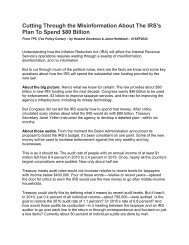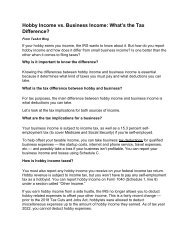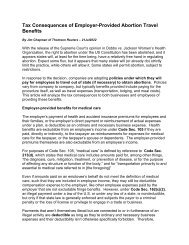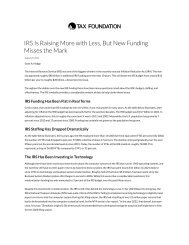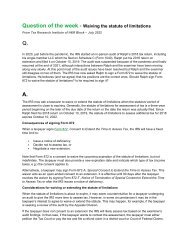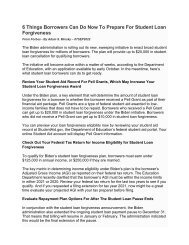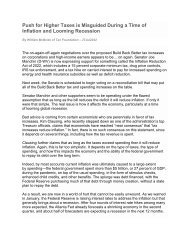Inconsistent Tax Treatment of Student Debt Forgiveness Creates Confusion
Create successful ePaper yourself
Turn your PDF publications into a flip-book with our unique Google optimized e-Paper software.
<strong>Inconsistent</strong> <strong>Tax</strong> <strong>Treatment</strong> <strong>of</strong> <strong>Student</strong> <strong>Debt</strong> <strong>Forgiveness</strong> <strong>Creates</strong><br />
<strong>Confusion</strong><br />
By Arnav Gurudatt and Garrett Watson <strong>of</strong> <strong>Tax</strong> Foundation – 20Jul2022<br />
<strong>Student</strong> debt forgiveness has been at the forefront <strong>of</strong> recent federal policy discussions,<br />
with President Biden exploring using executive action to cancel up to $10,000 in student<br />
loan debt per borrower. Under current law, the tax code handles debt forgiveness<br />
differently depending on the borrower’s repayment plan—canceling student loan debt<br />
would have new, potentially complicated tax implications for borrowers.<br />
Under current law, the tax code treats forgiven or canceled debt as taxable income, with<br />
some exceptions. If a borrower has debt forgiven, it is treated as if the borrower earned<br />
additional income in the previous tax year equal to the amount <strong>of</strong> forgiven debt. For<br />
example, if a borrower with an annual taxable income <strong>of</strong> $35,000 owes $20,000 in debt<br />
that is subsequently forgiven or canceled, the $20,000 in debt is added to their taxable<br />
income for a total <strong>of</strong> $55,000. Generally, a borrower is provided a 1099-C tax form when<br />
debt is canceled or forgiven, which reports the forgiven amount as taxable income to the<br />
IRS and the taxpayer.<br />
The current treatment is generally consistent with the “Haig-Simons” definition <strong>of</strong><br />
income as consumption plus change in net worth. Under an income tax, lenders deduct<br />
the cost <strong>of</strong> the forgiven loan from their taxable income while borrowers include it in their<br />
taxable income, creating symmetry in the tax system.<br />
Federal student loans forgiven under income-driven repayment (IDR) plans are typically<br />
treated as taxable income. <strong>Forgiveness</strong> under the plans is common because the<br />
borrower makes monthly payments based on their income, which may be less than the<br />
amount <strong>of</strong> interest accrued each month. The borrower’s loan balance under the plan<br />
may actually grow over time until the debt is forgiven, which usually occurs after 20 or<br />
25 years <strong>of</strong> on-time payments.<br />
While student loan forgiveness is generally included in taxable income, the current tax<br />
code contains a complicated patchwork <strong>of</strong> exceptions. The American Rescue Plan Act<br />
(ARPA) <strong>of</strong> 2021 temporarily exempted student loan forgiveness under IDR plans from<br />
federal taxation through 2025 under the rationale that tax burden arising from treating<br />
forgiven student debt as income partially undermines debt relief.<br />
Borrowers working at nonpr<strong>of</strong>it organizations or in the public sector are exempt from tax<br />
if they are forgiven under the Public Service Loan <strong>Forgiveness</strong> (PSLF) program.<br />
Another inconsistency involves the tax treatment <strong>of</strong> forgiven debt associated with closed<br />
schools. The rules were so obscure that even the Treasury Department was not initially<br />
aware <strong>of</strong> the associated income exclusion provisions. Since 2015, Treasury has sought<br />
to clarify the rules surrounding how discharged loans associated with closed colleges<br />
are treated in the tax code, arguing the compliance burden on borrowers and the
administrative burden on the IRS to quantitatively assess a given borrower’s owed tax<br />
was “excessive in relation to the amount <strong>of</strong> taxable income that would result.” The<br />
Treasury subsequently issued rules to exclude any discharged loans for affected<br />
borrowers from being counted as taxable income.<br />
Recent congressional legislation has moved toward exempting forgiven debt from tax in<br />
other circumstances. The Total and Permanent Disability (TPD) Discharge program, for<br />
example, which cancels federal student loan debt if the borrower cannot maintain<br />
gainful employment due to a medical condition, did not have an income tax exclusion<br />
prior to 2017. After the <strong>Tax</strong> Cuts and Jobs Act (TCJA) <strong>of</strong> 2017 was passed, however,<br />
forgiven student loan debt under the TPD became exempt from taxation. The<br />
exemption, like the temporary moratorium on the tax treatment <strong>of</strong> IDR loan forgiveness,<br />
is set to expire after 2025.<br />
Lawmakers have also proposed excluding all canceled student debt from taxable<br />
income. The <strong>Student</strong> <strong>Tax</strong> Relief Act would permanently exclude all canceled student<br />
debt from tax without changing the tax treatment for lenders. The Act would include<br />
student debt carried by up to nine million borrowers enrolled in IDR plans who owe $530<br />
billion—more than half <strong>of</strong> federal student loans in repayment in 2020. Alternatively, the<br />
IRS could classify forgiven student loans as qualified scholarships, as they did prior to<br />
1973, making student debt cancellation non-taxable like other types <strong>of</strong> scholarships.<br />
Policymakers must weigh the benefit <strong>of</strong> expanding tax exemptions for forgiven student<br />
loan debt against the complexities created in the tax base if lenders get write-<strong>of</strong>fs and<br />
borrowers get exclusions. From the standpoint <strong>of</strong> tax simplicity, the rules regarding the<br />
tax treatment <strong>of</strong> forgiven loans should be consistent and broadly applied, rather than<br />
fragmented.



